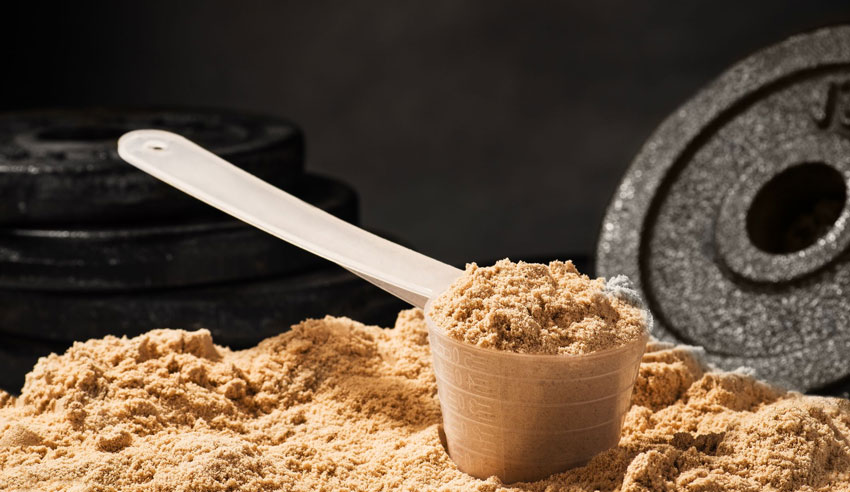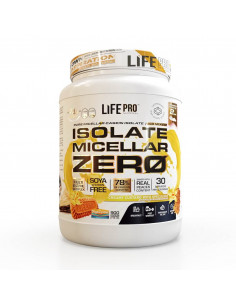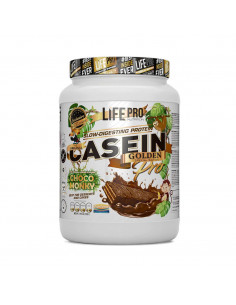Buy Casein ONLINE only best brands
Discover our great selection of casein proteins, to achieve the results you wanted. The best market prices. Only top brands.
What is casein protein?
casein is a type of protein, of high biological value that comes from milk.
What characterises this type of protein, and sets it apart from others, is mainly its slow absorption and digestion. . The release and absorption of amino acids from casein can be prolonged for a period of 3 to 7 hours.
Compared to a whey protein, casein has an absorption rate of 6-7 grams per hour, whey protein of 8-10 grams
If we analyse the composition of milk: the main soluble protein corresponds to approximately 80% casein , and the other 20% to whey protein (whey).
What differentiates casein protein from other types or sources of protein is its slow digestion and absorption . This is because when we take it, it forms micelles that coagulate in the stomach, slowing down the absorption process.

It is usually taken before going to sleep. Its main benefit is that, during all hours of sleep, we will be providing our muscles with the protein they need .
It also helps to prevent our body from entering a catabolic phase of muscle destruction and we will favour an anabolic state after an intense and effective workout.
Casein protein, possessing these particular characteristics, is used to ensure the maintenance of muscle mass during long periods in which protein intake will be nil or very low , such as during fasting, or during sleeping hours.
As a milk source, it is a protein of high biological value. It has all the essential amino acids that our body cannot produce on its own.
What are the functions of casein protein?
- Casein protein has the function of providing amino acids in a progressive manner over time.
- casein protein is a source of protein of animal origin (obtained from milk) and of high biological value (it has the 9 essential amino acids).
- Contributes to maintaining muscle mass during long periods when we are not going to eat any food.
- Avoids catabolism: or loss of muscle mass, because it provides amino acids in a sustained manner over time, it helps to maintain muscle mass.
- As a source of protein, it aids recovery after training.
- It has a fairly high satiating capacity: is one of the positive consequences of its slow digestion .
- Protein is one of the macronutrients with the highest satiety index, and being a slow-absorbing type of protein, this characteristic increases even more.
- Glutamine : Casein protein is characterised by high levels of glutamine. This amino acid promotes the recovery and regeneration of damaged tissues.
What is the best casein protein?
The best casein protein will be the one that is best assimilated and digested by each person. If we are not lactose intolerant, it should not cause any digestive discomfort.
If a person with lactose intolerance wishes to take it, it is recommended to choose a casein protein that has been enriched with a lactase supplement that allows it to be digested, or those that already have the Digezyme complex, to facilitate its digestion without causing discomfort.
In addition, in the field of sports supplementation, casein protein can be found in two different forms:
- Sodium caseinate: is a casein isolate with the particularity that when the production process is carried out, the micelles are broken down and combined with a source of calcium. It contains approximately 90% of its weight in protein, low in fat and lactose (less than 1%).
- micellar casein : is the most commonly used casein. It is obtained through a filtering process, without using chemical substances. It contains 85-92% protein and very low levels of fat.
Who is casein protein recommended for?
Casein protein is recommended for
- all those people who want to get a protein intake
- those who are looking for a supplement with the objective of providing protein that is released slowly and absorbed progressively.
- all of them with the objective of maintaining, recovering or gaining muscle mass.
- people who are fasting, want to increase their satiety levels and ensure the supply of amino acids to their muscles.
How much casein protein should I take?
Each person has different protein needs that should be consumed each day.
The total protein consumed throughout the day and the different sources of protein from which it is derived must be considered to establish the desired amount of casein to be taken.
The average dose per day is usually 20 to 40 grams per serving.
When to take casein protein?
Before going to sleep, or long periods without consuming protein:
Promotes a positive nitrogen balance, i.e. stimulates protein synthesis.
It is recommended to be taken during periods of fasting, whether intermittent fasting or at night. It will help to avoid catabolism, and releases the amino acids needed at all times in a progressive manner.
Protects and helps build muscle mass and promotes recovery after workouts.
After training:
It should be remembered that it is the macronutrient responsible for repairing damaged tissues after training.








